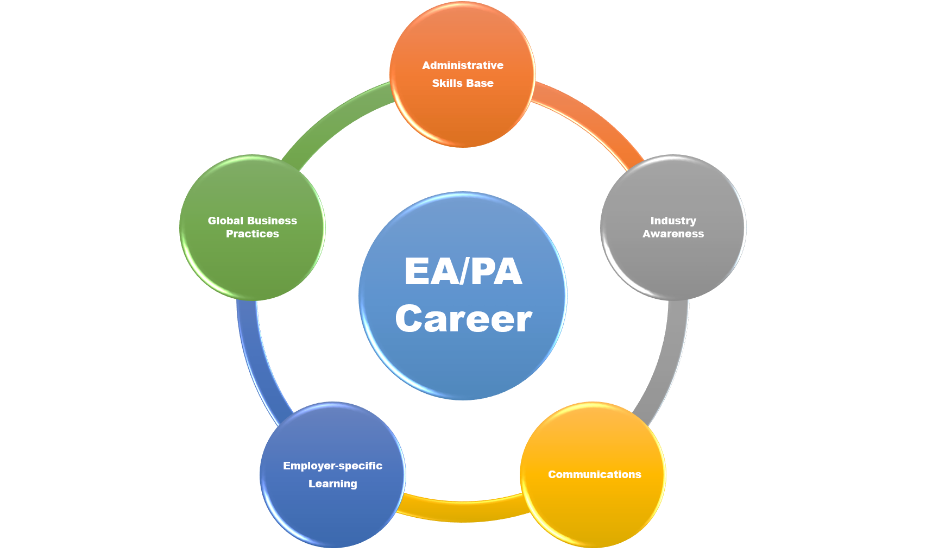
Build your knowledge set and expand your perspective explains Kemetia Foley
Time and/or money can be the most common roadblocks to professional development. This is true in any profession, but especially so in the administrative profession.
Companies are moving away from administrative titles so it is imperative for PAs to look at their employment in a holistic fashion and build from there. Let’s build on your already steady foundation of knowledge and review the five spheres for low-cost ways to up your admin game.
1. Administrative Skills Base
These are basic skills each and every administrative professional needs to keep at the moderate level of competency, if not advanced, depending on your job requirements and organization.
Software: Word, PowerPoint, Excel, Outlook and database entry, search and reporting, whether it be Access or another database utilized within your organization.
Sharpening Skills Resources
- YouTube Tutorials
- Administrative network peer-to-peer training
- Free webinars
- Published articles
- Public library
2. Industry Awareness
Understanding your employer’s industry allows you to gain awareness of potential changes of corporate strategy and standing. Administrative professionals can do a much better job of anticipating downsizing or a need to adapt a new skill within their organization if they observe the dynamics of their company’s industry(ies). There could be a new safety or business regulation that directly impacts your organization. Or, perhaps there is a focus to recruit university students to work within your company’s industry.
A fitting example would be the travel industry. It’s incredibly competitive. Think about the staff that support that industry whether it be with an airline, a trade association that supports the industry, the manufacturers involved with building airlines, trains, cruise ships. And, what about the meetings industry that is deeply intertwined with the travel industry? Is there less or more business travel?
Building Industry Awareness Resources
- Business news outlets and publications: Forbes, Bloomberg, Wall Street Journal (not all articles are free but, they often get re-blogged or re-posted)
- Industry-specific trade magazines or websites: each industry may have one or more publications discussing the people, places, and challenges of the industry. Book mark these or subscribe to their posts. Follow them on social media.
- Industry-related associations and influencers: know the competitors and influencers within your industry. Again, you can follow many of these influencers on LinkedIn or other social channels.
- Industry-related networking events or webinars: Conferences or local meet-ups. Utilize Eventbrite or Meetup to look for industry-related networking opportunities.
- Your organization’s public relations team and any related publications.
3. Communication
Is there any other area as fraught with potential for disaster as communication? There are as many ways to approach team communications as there are consulting firms willing to charge your company to better navigate it.
Where is the challenge really? Is it the company culture? The staff demographics? The lexicon of the industry and/or company product? Global offices? Any and all of the above apply. It takes time, effort, and focus to improve towards more efficient communications.
There is a reason that the International Association of Administrative Professionals establishes the Communications segment of the Certified Administrative Professional® exam with the largest percentage of exam questions, and that reason is because communication, written and verbal, is the most vital function in business.
Know your organization’s communication focus when you are in the hunt for resources. If you know that your organization’s budget dollars are primarily spent on sales and marketing, it’s a better use of your time to invest effort in that facet of your organization—but as it relates to your work, your department.
Communication Resources
- Company Style Guide and Personnel Manual: Get to know internal training, which we’ll discuss next. A large portion of training covers company style, expectations, processes. If there isn’t internal training, begin documenting how YOU learned to best communicate within your company and with customers. This document can later be built into a procedures manual.
- TedTalks and Other Professional Speakers on YouTube: TedTalks are by far my favorite method for researching communication styles, especially those that focus on culture differences and non-verbal body communications. These are free and take a short time to watch. I like to watch one, take notes, and then fold that into my annual professional development log. I also seek out professional speakers on YouTube by topic, that is how I came to know of Shep Hyken and Kate Nasser in the customer service arena. I learned about Snapchat and Vlogging from Amy Schmittauer, Carlos Gil, and Shaun Ayala. Many organizations do not put their conference keynote speeches directly on YouTube, but you may catch snippets of their presentations posted by attendees or view any Twitter feed transcript of the presentation if the organization utilized Storify.
- Public-Speaking training: take on opportunities to speak at work on a subject you love. Or, become more comfortable with public speaking through a group like Toastmasters International™. It is of utmost importance in business to establish a solid comfort level with public speaking and presenting.
- Peer-to-Peer learning: It’s always easier to run something past another colleague that does not work for your organization, but either works as an admin supporting the same level of staff or executives, or within the same industry. They are a great resource for sharing learned experiences—what works, what doesn’t. This is especially true if they have more tenure. Finding professionals that are willing to open up about their own work experiences is important, but building that mutual trust and understanding of maintaining confidences between the two of you is key.
- Another resource would be association discussion boards and/or LinkedIn groups. Be sparse on specifics to the communication challenge, but ask for individuals willing to communicate directly by phone or email. Of course, you can join administrative organizations, subscribe to administrative publications, such as Executive Support Magazine, or purchase products from administrative trainers like Richard Arnott, Anel Martin, Julie Perrine, Marie Herman, or Bonnie Low-Kramen.
4. Employer-specific Learning
I certainly hope you aren’t charged a fee to learn more about your company’s products or people! How does this help the administrative professional? It will help in crafting communications to learn to write and speak in the ‘language’ of your organization.
Employer-specific Resources
- In-house tutorials or lunch and learns to share information about new products, tools, and events. Take advantage of as many of these as you can, even if it is not touted as a direct training tool for staff —you can seek out webinars or recordings of industry-related topic presentations by staff.
- Training for any specific software that is used only in your organization. For example, if the company utilizes Razor’s Edge for fundraising, they may provide you with additional internal training or access to a corporate Lynda.com account to boost your knowledge of this tool.
- All-hands staff meeting. This can serve as a fantastic opportunity to learn about new initiatives, new software, company goals, and the efforts of other departmental staff. It’s more learning than training, yes but, it is also a pipeline to potential volunteer and learning opportunities.
5. Global Business Practices
The global economy continues to morph at a rocket’s pace and global business practices need to adjust as quickly as possible. There are many factors that impact the global economy, politics, weather-related disasters, man-made disasters, currency fluctuations and changes, and workforce availability to name just a few. When individual G-20 countries have major economic changes or challenges, it ripples across the entire globe. These events can sometimes occur quickly or be years in the making. For most of the working population, these events are well outside our control, yet they can and often do have an impact the modern-day worker.
These changes can be made in the minutiae of administrative work as well, such as the move from double-space to single-spacing between the end of a sentence and the beginning of a new one. Or, in recognition of changes in currency fluctuations impacting your supervisor’s travel. Or, in knowing the political changes in countries in which your company does business—and the safety implications for your team.
The significance to administrative professionals is not lost here. Often considered non-revenue contributing personnel, they are, in most cases, the employee first dropped from the company payroll.
Global Business Resources
- International Organizations: The United Nations, World Health Organization, The World Bank, The International Monetary Fund, The International Red Cross, World Trade Organization
- Publications: The Economist, Harvard Business Review, Barron’s, Financial Times, Entrepreneur, Forbes
- Business Names to Know (my list, not in any order of importance): Sir Richard Branson, Virgin Group, Business Mogul, Philanthropist; Sheryl Sandberg, COO Facebook, Author, Speaker; Zhang Xin, Global Real Estate Mogul; Mel Robbins, Author & Speaker; Oprah Winfrey, Media Mogul; Jeff Weiner, CEO, LinkedIn; Howard Shultz, Chairman, Starbucks; Seth Godin, Author & Speaker; Harriet Green, Thomas Cook
- Social Media Channels: Social media channels allow for access to all kinds of international resources, influencers and industry leaders. Be sure to curate a list on Twitter, subscription on YouTube, or follows on LinkedIn of the organizations or leaders from which you want to understand more.
- Orkut (Latin America) Source: [http://www.seowebmarketing.co.uk/social-media-2/latin-america-social-media-overview/]
- See international map of global social media channels at http://vincos.it/world-map-of-social-networks/
If you can invest 15 to 20 minutes a day in one of these spheres, document it, and add it to your professional development efforts, the investment will be worth it. Rotate through the five areas weekly. You’ll be able to build your knowledge set, expand your perspective, and provide a solid reporting of your self-motivated efforts. There is no doubt that these efforts will raise your recognition and reputation as an extraordinary administrative professional.













